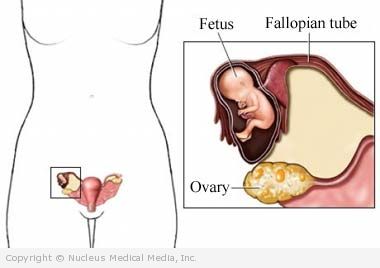(Tubal Pregnancy)
Ectopic pregnancy – Definition
An ectopic pregnancy is a pregnancy that occurs outside of the womb (uterus). Most ectopic pregnancies occur within a fallopian tube. Other, less common locations may include the cervix, the ovary, or the abdominal cavity. This type of pregnancy cannot survive because only the uterus can support the growth of a fetus and its placenta.
Ectopic pregnancy – Causes
Most ectopic pregnancies occur because the fallopian tube is not functioning normally.
Ectopic pregnancy – Risk Factors
Factors that may increase the risk ectopic pregnancy include:
- Previous ectopic pregnancies
- History of pelvic inflammatory disease (PID)
- Endometriosis
- Prior surgery on fallopian tubes or uterus
- Fertility treatments
- Abnormally-shaped uterus and/or fallopian tubes
- Presence of an intrauterine device (IUD)
- Pregnancy that occurs after a sterilization procedure ( tubal ligation)
- Smoking
- Race: non-white
- Age: 35 or older
Ectopic pregnancy – Symptoms
Symptoms include:
- Missed or abnormal menstrual period
- Abdominal pain
- Spotty vaginal bleeding
- Pain in the shoulder
- Fainting
Ectopic pregnancy – Diagnosis
The doctor will ask about your symptoms and medical history. A physical exam will be also be done.
Tests may include:
- Pregnancy test
- Pelvic exam
- Blood tests
- Transvaginal ultrasound (to check the uterus and fallopian tubes for the presence or absence of a pregnancy)
Ectopic pregnancy – Treatment
Treatment options include:
Medicine
If the ectopic pregnancy is small and has not ruptured (burst), your doctor will recommend the medicine methotrexate. This medicine prevents further growth of the ectopic pregnancy.
Surgery
Surgery may be needed, especially if the ectopic pregnancy has ruptured or if it is not in the fallopian tube. During the surgery, the pregnancy will be removed.
If the pregnancy is in the fallopian tube, the doctor may be able to repair the tube. In severe cases, the fallopian tube may need to be removed.
Ectopic pregnancy – Prevention
While there are no clear ways to reduce your risk of ectopic pregnancies, it may be helpful to:
- Maintain safe sexual practices to avoid sexually transmitted diseases (STD), which can damage to the fallopian tubes and ovaries.
- Get early diagnosis and treatment of STDs.

